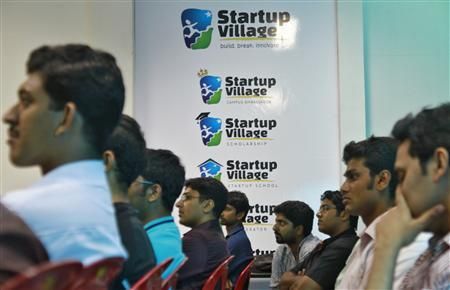 'Some of these companies are India focused, some are overseas focused and some companies are focused on both.' Ritu Jha/Rediff.com reports from California.
'Some of these companies are India focused, some are overseas focused and some companies are focused on both.' Ritu Jha/Rediff.com reports from California.
ALSO READ: Tesla's Gigafactory promises to change the world
'TiECon has once again become relevant to entrepreneurs'
This is the first time I have been away from the office in the last eight years," said Ravi Varghese, CEO and Head, Product Management and Marketing at CustomerXPs, a Bengaluru-based company.
Varghese was among managers from 39 Indian start-ups who were part of the Innotrek delegation which visited Silicon Valley last month.
India's National Association of Software and Services Companies -- NASSCOM -- launched the Innotrek initiative three years ago to scale up the start-up ecosystem in that country.
The Innotrek delegation visited the San Francisco Bay Area for a week starting May 11. It visited major Silicon Valley companies -- Facebook, Google, LinkedIn and Intel among others --listened to Silicon Valley venture capitalists and attended workshops like 'Building a Global Startup; Building Buzz & Brand for your Start-up'; 'Acceleration the Silicon Valley Way' and 'Talk and The Reverse Journey: From VC to Start-Up Entrepreneur Again at 44,' by Karl Mehta who left Menlo Ventures to start his third company, EdCast Inc, at age 44, defying the conventional career path and conventional wisdom in Silicon Valley that companies are best started by people in their teens, 20s or 30s.
"It has given us a new perspective of the various aspects of entrepreneurship," Varghese told Rediff.com. "The way fundraising happens, the way networking works, the way mentors work, the give and take. We do not have a networking ecosystem in India. It's not that mature."
"Also, enterprise entrepreneurship here is more structured, the process driven. The openness we saw here is not there. Helping each other is very important," Varghese added.
Another attendee, Kalpit Jain, founder-CEO, WAGmob, a learning acceleration platform company with offices in Bengaluru, Indore and Seattle, said he had pitched earlier, but not the way he did at the entrepreneur Shark Tank Pitch event.
"I wasn't planning to pitch," Jain said. "Ravi Gururaj (chair, NASSCOM Product Council) was helping us how to pitch. One of my partners said, 'Why don't you go and pitch?' Listening to Gururaj was really helpful. He asked me to go on stage and that motivated me to pitch. This was the first time I was pitching in front of a large audience."
"I was nervous initially," Jain added, "but seeing your peers doing a good job motivates you. And it was a supportive audience. It was an amazing experience."
"There was amazing entrepreneurship on the bus and there was so much energy and excitement," Jain said. "People were really, really, helpful. NASSCOM was able to get amazing people together."
"Only ideas don’t work," Rajat Tandon, Senior Director, NASSCOM 10,000 Start-ups, told Rediff.com "We are trying to help engineering graduates start from their ideas. That is why we are building a hub of spaces unlike Silicon Valley, where an idea gets funded immediately."
"In India that's not the situation unless you prove to the community that you have good prototype planning, you have customers, you have revenues coming in," Tandon added.
"I would say 40 percent of the start-ups are from Bangalore (Bengaluru)," he said. "Right now the buzzword (in India) is smart cities and in smart cities you need IoT (Internet of Things) teams, healthcare, financial tech, ad tech."
NASSCOM, B V R Mohan Reddy, chairman, NASSCOM, told Rediff.com, has just celebrated its 25th anniversary. "From a small beginning of 100 million dollars, it's going to be 100 billion dollars just on software export revenues," he said.
"It is an unparalleled story anywhere in the world," he added. "NASSCOM played an extremely important role with its membership. NASSCOM doesn't produce revenues, its membership produce revenues. We worked on policy issues, global issues and development and initiatives with governments," Reddy added.
"One of the things we believe is that in the product arena, where India is slowly emerging, start-up companies require a lot more support and need global exposure. Three years ago, we started an initiative called 10K Start-ups," Reddy said.
NASSCOM wants to launch 10,000 IT companies in India. As a part of that particular initiative it also created the start-up initiative track, InnoTrek. Last year NASSCOM brought 25 start-ups to Silicon Valley; this time, 39 start-ups came along.
"It is a good sign they are growing. These are the companies which have high potential in them. Some of these companies are India focused, some are overseas focused and some companies are focused on both," Reddy said. "Our belief is that people could start with India as a focus and very quickly as the product gets accepted, you get into the global market without thinking too far."
"So, we have curated these companies (the start-ups), given them enough advice and brought them here, exposing them. They want mentors, so we are trying a mentor programme. They want to raise money, so we are trying to connect them to the VC community. They want to do business here," Reddy said.
"What is important is that the thought process and thinking has become far different. They become very holistic. India gives you one facet of life, the US governs differently and so we make sure these people can put all of these things together."
“The US is a large unified market with a single language and a single culture, which allows companies to grow big before they can start thinking of international expansion," Gururaj, chair, NASSCOM Product Council, said. "We want to give them the exposure that will help them not only ‘Think scale, but think global'."










